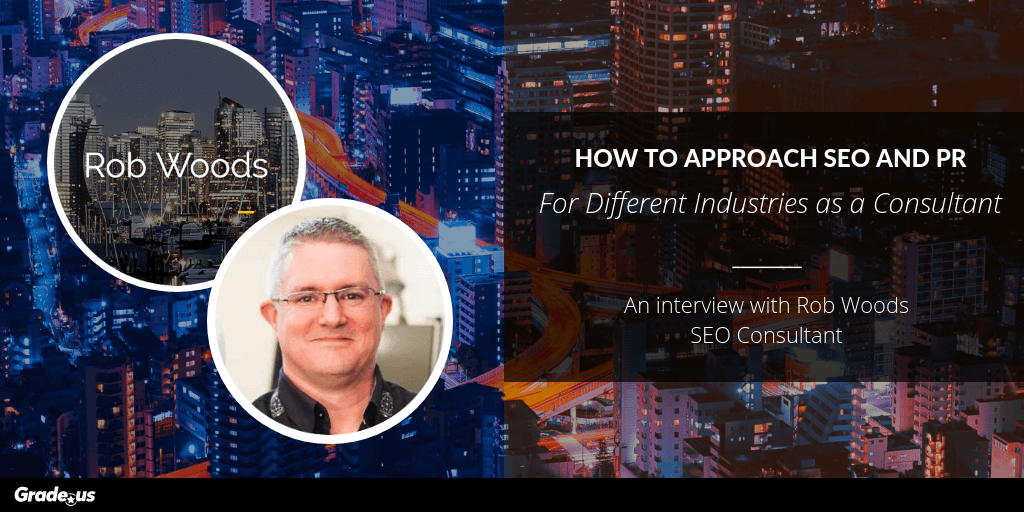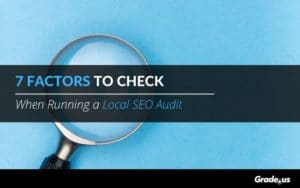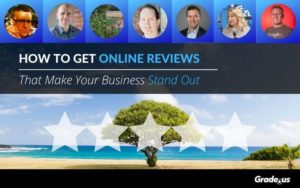If you've been to Pubcon, SMX Advanced, or numerous other conferences, you might have heard Rob Woods speak. He's also edited three books on SEO and has written numerous articles.
He uses technical SEO like a scalpel to fix his client's traffic and ranking problems, as well as keen analysis and PR skills to help them come up with a fantastic traffic and backlink strategy. Patient and methodical, Woods tackles some of the toughest types of sites in the industry, producing excellent results for his clients again and again.
When we sat down together he had plenty of insights to share. Here's what he had to say.
On the major differences in how one can approach SEO and digital marketing for various industries
Carmen: So to get started, I've read that you're currently focusing on the eCommerce, real estate, travel, health, and publishing industries.
How is working for each type of business different? For example, what's different in your approach to a travel site vs. a real estate or health site?
Rob: Sure, well...there certainly are some large differences between those two for sure.
So, travel, it tends to be much more, at least the clients I've had before, much more static sites. They're very graphically driven, video driven, they tend to have a smaller number of pages sometimes. The biggest issue from a technical SEO standpoint for them is generally just trying to reign in designers, content creators, to let the pages be as fast as possible. That's the biggest challenges I have on the travel site side. It's so visually-driven that it's tough to balance speed with the type of design and visuals that they want to offer.
Real estate is an interesting one. Particularly for real estate, it's really all about managing millions or tens of millions or even up to hundreds of millions of pages. Making the crawl as efficient as possible, Google's crawl of the site, making sure it gets to enough pages. A big part of that is also speed and keeping the pages as small - as overall low weight as possible, so that Google crawls more listings quicker.
The big thing, particularly for new listings, is you wanna be the first one indexed when new listings are added. Using certain techniques, even down to say, something like, RSS feeds which aren't used that much anymore, to get new listings indexed as quickly as possible. Particularly getting them indexed before the competition, so that when those new listings come up, you're the first one that appears. It's not even about outranking the competition, but just appearing, period, in the SERPs before the competition.
When you go to something like a health site, that's very different again. They tend to be smaller. It's not so much crawling and efficiency, as much as the quality of the content.
The health sites I've worked with tend to be all very high quality content. Or, at least, the ones that are successful are. Recent updates have really hit health sites. I'm sure you're aware of that.
A lot of health, especially if they are alternative health sites, really got beat up in the last two to three major broad Google algorithm updates. So sending trust signals in the quality of your backlinks, the quality of your content is vital. One of the big determinants of success I've seen there is actually having your content written or reviewed by qualified actual medical professionals. It's having enough information around those professionals available on the site and on other sites to back up the fact that they are a recognized, or a legitimate, expert in that particular health field.
Carmen: So, you've got to get the buy-in from the people who own the site to get them to participate in that process.
Rob: Yeah, absolutely. It's not always easy. It's not always easy hiring a doctor to almost do reviews or peer reviews on all of the articles before they go live. To take that feedback, reincorporate it back into the content. But I think it does definitely pay dividends to be a little tougher on some of the other, more alternative medicines where there isn't quite the same level of expertise available. Ideally finding a recognized, MD or something equivalent to that to review that content.
Carmen: How did you decide to zero in on these specific industries?
Rob: A lot of it is just how sites came to me. Almost all of my business comes from referrals from other people I know in the industry, whether it's former clients, in-house SEOs who just don't have time to take on outside clients, or even in-house SEOs who want a second opinion. A lot of it really just came to be that way.
These also tend to be the sites that are larger and have large enough budgets to support reasonably good-sized audits. I do some local work, but when I do local, it tends to be in a more scalable way. I don't take on a single local client for myself. Generally. But I might do all of the SEO for an agency that has 10 to 12 local clients.
On the local SEO pitfalls for retail stores
Carmen: Speaking of local, are there any pitfalls to consider when you've got a local retail outlet that needs both local SEO and eCommerce services?
Rob: I don't know that there's so much pitfalls, in my opinion. I certainly have some fashion brands that are in that space, where they have a local boutique and an online presence.
I think it's just more "and" rather than pitfalls. So in addition to doing all of the usual eCommerce things, there's a lot more you need to know for local than for pure play-online eCommerce sites. Whether it's local links and citations, locally based content, Google My Business optimization, reviews, all of those things.
So, not so much of a pitfall as just local SEO and kind of pure play online are different but similar disciplines, and there's a lot of knowledge necessary on both sides. So if you're doing a bricks and clicks retailer you need to know both sides of it.
On learning about clients, their business, their advantages, and their weaknesses
Carmen: You spend several weeks getting to know a customer's business before you do anything else. What process do you use to do that?
Rob: I'd say there's probably several things I do. Certainly when I start an engagement I send a fairly detailed SEO discovery document, and a lot of the stuff in that document is around information about their products, how they manage their business, and new products or services. I certainly gather personas if they have them. Obviously a lot of smaller clients won't have buyer or client personas. B2B and bigger clients tend to have that kind of thing.
Certainly spend a lot of time with the site itself. Do a kickoff call with clients that again we discuss a lot of the same kinds of things, what services they're particularly good at, if there are products or product categories they want to feature more than others because they have less competition or perhaps better margins. And then, I think early on in the engagement, I like to do the keyword research and page and new content plan. And a lot of learning comes out of that. I'll gather keywords from their site, all the products and services we've talked about, competitor sites, all that.
And go through several iterations of both, taking my best guesstimate at which terms are relevant and which aren't, and I think that discussion process of going back and forth and saying: "Hey, did I get this right, have I missed anything," and going back and forth until we really refine that list of "these are really the keywords that are important to us?" Gives us a huge amount of learning about the business, and then we take off and actually make the plan from there.
Those are generally the things I do to kick off an initial engagement to learn about the business.
Carmen: You've also had to have some hard conversations with potential clients. Informing them that they don't deserve to rank well because there's nothing special about either their business or their site. How do they take that? And have you ever told a business this and see them make some major changes in response?
Rob: Yeah, that's always a tricky one, right? People don't like to hear that there's nothing special about it, so I maybe don't couch it in quite that blunt a way when I'm speaking directly to the client, that there's "nothing special about you?" But I try to be a little bit more diplomatic. "You're very similar to a lot of your competitors in pricing, services, and selection." And really, again, it's part of the getting-to-know-them process. "What is your advantage over the competition?" Is it your location?
There's got to be something that's special. Because if there isn't something that's special, you're not likely to outrank them. There's all kinds of things you can do to compensate for that, but unless you're actually the best at something, you're not going to rank the best unless you are the best. I've had to have conversations...a lot of clients have had negative feedback or poor reviews, and of course the best solution for that is you need to improve so you don't get poor reviews, right? And that's the tide that lifts all boats. If you get better reviews, if you just have better service or better prices that's a bigger lift than me going out and building ten links for you, or something.
Generally, when I've told them this, if it's the right client...the biggest way to compensate for that is they either need to start doing something special in the PR area, for more visibility, or they have to be really really good at content. Being really, really good at content is sort of the compensation for "there's nothing else really special about your business." If you're not outstanding in some kind of service or price or something you do differently from everything else, you sort of have to fall back on being the best at generating content or some other facet, or you're just not going to stand out enough.
Carmen: So breaking away from those "Ten Reasons You Need a Realtor" posts to some really in-depth stuff.
Rob: Yeah. There's so much of that stuff! Every one of your competitors is going to have somebody telling them to write the same posts, you know? Ten things to do in Dallas, TX. If you're a local business.
Or, I was seeing a discussion even the other day on one of my Facebook groups that even digital marketing companies are not very good at that. Everyone writes the same post over, and over, and over again.
One of my friends is an editor of one of the big tech blogs, and she says the same thing. People just continue to submit stuff that is just the same as everyone else. That can get you started if you just have nothing, but that content isn't really going to rank for much unless it's very specific, or something very big that nobody else is doing?
Carmen: Now I know that when I've worked with clients as a copywriter, I've asked them what sets you apart? And they always say customer service! How do you deal with that one?
Rob: Well, again, it's, are you truly better than your competition at customer service. Are you? If they are, again, that probably doesn't directly equate to rankings other than maybe for local rankings where if you truly are amazing at customer service we can definitely put together a review strategy, to make sure you're actually getting those super-happy customers to review you.
Maybe it's testimonials, testimonials can be extra content, it can be locally-focused content: "Jane Smith from Philadelphia said this about us," and you put that on your page for your Philadelphia location, and it helps with that sort of thing. But everyone thinks they're pretty good at customer service, so sometimes you have to have that hard conversation with them. Unless you actually are.
You know, like a Zappos back in the day where you could buy shoes, return them, free-of-charge, no-question returns, that is really better customer service than everyone else. So unless you're really doing something exceptional like that, you really have to have that hard conversation. Just saying you're good at customer service, everyone thinks that, it's not going to make you stand out unless you really are doing something truly spectacular that nobody else is doing.
On developing best-in-class SEO driven content that generates traffic
Carmen: When the business is trying to set itself aside through content, what do you recommend that they do to truly develop the content that nobody else is delivering?
Rob: There's a couple of different ways to do it. And I will admit that my forte is not the big, super-innovative, super-creative stuff that no one else is doing. They should be doing that, sometimes you can help them brainstorm that, probably, I'm much more of a technical person than that. That may not be my particular forte.
I tend to approach it in a much more analytical way, and look for gaps. Look for what terms are there out there that you're close to ranking well on, or that your competition's doing very well on and you aren't. So I look for a lot of the keywords gaps in that kind of thing. And then I really go more after the type of content that either has earned links for your competition and do something similar but not the same, not just do...and not even the skyscraper strategy where it's like, "Well if you have 1,000 words about that I'm going to write 3,000 words."
I do a little bit of that, but not a ton of that. So, can you take an idea for something that was successful from a link or social perspective and use it as inspiration for something more related to your business? But that isn't the same?
Because if somebody's linked to something that's really amazing about a very specific topic they're not likely to do it again for another piece that's just very interesting for the exact same topic.
I certainly look for, and again, I go a lot back to the actual search engine results. So I look for opportunities where perhaps a client can write a piece of content that will capture a featured snippet, look a lot at the people also ask kind of content, so I really look for gaps where the competition isn't there or where the competition is sort of vulnerable and I think we can take listings away from them as opposed to the really creative, big interesting type of content, which again isn't sort of my forte.
Carmen: I think you can approach it from either way, and it seems to be working for you.
Rob: And you can do both, yeah. It's just generally I'm not as creative to come up that really crazy stuff. And sometimes I'll rely on other people that I know that really are fantastic at that stuff to help with that side of things.
Carmen: You also achieved a 25% increase in traffic in just 3 months for your primary client. How did you make that happen?
Rob: So, generally, any time you see an increase that quickly, of that size, it's going to be technical issues. If really all you need, if your site is really solid, or again quite small, technical changes are going to help, always, but it's not going to make that big a difference.
If your need is content and links, they're probably not going to start helping you much after three months. You know, you're probably three months getting a solid content strategy in place and starting to execute on it, and then links are coming even after that.
So in that case, there were pretty substantial technical difficulties on the site, both with the ability of Google to crawl pages, the way the internal linking was flowing link value through the site, and quite large duplicate, near-duplicate thin content issues that could be addressed and solved fairly quickly.
On PR and dealing with rejection
Carmen: You're also doing a lot of PR and press outreach work for your clients. How do you approach a reporter when you're approaching them on behalf of a client? Are you pitching them stories, or just drawing attention to things they're doing?
Rob: Generally, for me, the success I've had there is less in pitching stories, as opposed to taking advantage either of specific events, specific dates, or, again, a specific thing the client is doing. So it isn't, generally, "Hey, my client has really great customer service." That's not the kind of thing a client is doing that anyone cares about.
So it has to be an event they're sponsoring, a charity they're participating in, something like that, or something that's very tied to say, a specific event or a specific date, when I know a reporter has an editor breathing down their neck saying, "You've gotta write about this, because this thing is coming." So whether that's a show, a conference, where I probably had the most success with this was when I was with BlackFriday.com.
You know Black Friday is coming, you know every retail writer in North America has to write about Black Friday. And so a lot of it is approaching them based on, either that sort of human interest level of story, or, "Hey, we are the experts in this space, I know you have to write an article like this."
Don't say that in so many words. But we can help you. We can make it easier for you to write the article I know you have to write anyway.
Carmen: It sounds like this work also involves a lot of rejection. Do you ever find that frustrating?
Rob: Not if you approach it in the right way. You can't take it personally. You have to know you're going to have a low success rate going in. You just are. If you pitch 100 reporters, you're not getting 30 of them to write an article about you. It just isn't going to happen. So you just have to look at it as a numbers game.
If I get interest from 1% or 2%, that's a success. It's not that the 98%, or the 99%, is a failure. That's a success. I was kind of thinking about this before the call.
So...I fish a lot. And you can't get frustrated if you don't catch a fish on every cast. Right? You cast 100 times, you catch a fish. You're not upset you didn't catch one on the 99. You just have to be happy you caught one on the 100th.
It's sort of the same thing. So, you can get a little frustrated, but you really have to look at it like you're casting a wide net, and if you get a couple of hits, focus on those, don't focus on the ones you didn't get.
Carmen: Besides including a press or media webpage on their website, are their things companies can do to make themselves more attractive to the press? Especially if they've never been featured before?
Rob: So there's a couple of things I alluded to earlier. Anything you can do to make the article easier to write for the reporter is helpful. If you can create images, you can give them data that either other sources don't have or that would take a long time for the reporter to compile, and you already have it.
Anything that makes it easier. If you can give them quotes. I know even when I'm doing print outreach, a lot of times the reporter wants to speak to you on the phone. Being available for them. "Hey, I need to talk to someone in the next three hours." Be available for them to speak in that next couple of hours.
Frequently they want a sound bite. Even if it's a print piece, they want a quote. So it's just easier to be available for them for sure. I think the other thing is impressing upon them that they can trust you. Anything you can give them to back up that you are an expert in the space, so they aren't going to look foolish by using you as a source.
So, you know, we used to talk about...do we have a use social media following? So we get a lot of data from people because we have this huge social media following.
Or we've been doing this for X amount of time. Or we've been quoted in these other publications. It just gives the reporter a little bit more sense of, "Oh, okay. If they've been featured on CNN and written about in this newspaper, they've been doing this for 20 years, and I can trust that the information they're going to give me is accurate and I won't look foolish by taking information from them if they're not a trusted source."
On the biggest mistakes SEO content consultants make
Carmen: What is the biggest mistake you see other SEO and content consultants making?
Rob: On the content side, again, I think it's just pitching the same run-of-the-mill content that everyone else has. If all you're doing is what everyone else does, or there's 100 articles on that topic already, it's just going to get lost in the noise.
Now I see lots of people doing that, I see lots of people billing clients for that. The client doesn't necessarily know that it's likely this article really doesn't have a chance of success.
When I look at content, I generally look at it through the filter of SEO, because that's my main focus. And so, looking at the competition. The level of competitiveness for terms around that content. Do you even have a hope of ranking for it? Or are all the sites ranking for it the top six or seven tech blogs in the world?
Well, you're not likely going to outrank CNet and those type of sites for writing the exact same thing. So, that's what I'd say likely on the content side.
The biggest mistake I see other SEO consultants making, and I wouldn't class the top SEOs in this kind of category, but I would say more Junior ones focusing too much on the sort of traditional minutiae of title tags and heading tags and alt attributes, and the real minutiae of on-page SEO as compared to larger scale things like indexation, the level of overall content quality. Or how many pages that you have indexed that are of quality, that search engines seem to value.
Crawl efficiency. If you're making Google crawl five million pages on your site, but they're only indexing 100,000...that should tell you something. That maybe they don't value a lot of your pages, but it's also...making improvements in crawl efficiency I've actually seen make big differences in rankings. So I think the biggest mistake I'd see, just to reiterate, is focusing on the microstuff without considering the macro stuff as well.
Carmen: When these pages have a bad crawl architecture, that seems like an enormous undertaking to reign it back in. How do you make sure you get them all where they need to be?
Rob: Well, I think it's very different between something like an e-commerce or a classifieds listed site and a content site. With the content site it's a little bit easier. You have a site, maybe they got 1000, 5000, 10,000 pages, articles...those I really look at the whole body of everything they have. And which pages clearly have value? Which pages have any traffic at all, even just page use? Is anyone reading the thing? Does it drive any search traffic? Does it have any social shares? Does it have any links?
If it doesn't have any of those things, I'll go through and actually look at every article and say, "Look, this thing is about a piece of software that was released 9 years ago, you probably don't even need this page anymore. We're going to eliminate this page from the site entirely."
Oh, here's one that's about your company picnic five years ago, nobody cares, get rid of it. Oh, but here's a page lots of people are looking at internally, but it's not driving any search traffic and it's not likely to. Ok, let's no-index it, leave it on the site, we just don't want it in the index. We still want it there for people.
So, I'll do kind of a mixture of that. Is it important for search, is it important for users, if we're getting rid of it, how are we getting rid of it, are we going to no-index it, are we going to delete it and redirect it, are we going to delete it and let it 401 or 410, those kinds of things.
On the much larger, more dynamic sites, like eCommerce, classified listings, real estate listings, that's quite different. And you really have to look at it more as page-types and page-templates. Obviously faceted navigation is a huge thing there. I've seen lots of sites where every permutation of every facet in the navigation is able to be crawled.
But maybe they have them no-indexed. Maybe they have them canonical back to the main category page. But they're still being crawled. That's hugely inefficient if those pages aren't giving you any value to tie up the crawlers crawling those. So, on the larger sites, you have to look at it much more as page types, because you simply can't tackle it one page at a time when it's a 5 million page site. You're just not going to do that.
It really depends on how you want link equity to flow through the site. Do you want the page to be crawled compared to indexed, so it's a lot of playing with either the meta-robots no-index, the robots.txt file, internal links, even occasionally no-following internal links just to make the crawl more efficient to go where you want it to go.
Carmen: And finally, have you got any upcoming speaking events you'd like to share with our readers?
Rob: The only one I have coming up this year is Pubcon Las Vegas in October.
Want to hear more from Rob Woods? Follow him on Twitter at @robdwoods.
About the Author
Raney C. Hudson
Raney C. Hudson is an independent content consultant with a 10+ year track record in the digital marketing industry.











